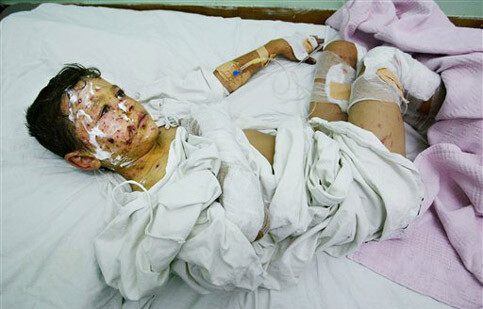Médecins du Monde 12 October 2004

Palestinian child injured by shrapnel during Israel’s military assault on Gaza. (PCHR)
The Israeli army entered northern Gaza with a large force on 28 September 2004, with the stated aim of reducing Qassem (Palestinian) missile attacks on Israeli towns. In the course of this incursion, they occupied the perimeter of Beit Hanoun, parts of Beit Lahya and Jabaliya. There has been much fighting, particularly on 30 September, and extensive use of Israeli armored vehicles and aircraft. Of note, the Israeli military has frequently used missiles targeting individual vehicles, buildings, and people.
Medical consequences
Large numbers of Palestinians have been killed and injured, many of them civilians. As of 13 October, the UN reported a total of 94 killed, 417 injured in north Gaza, more than 25% persons 18 years or younger. Five Israelis have died, including two children.
Two small hospitals in the north, Kamal Adwan and Al Awda, have cared for most of the casualties, before transferring the more serious cases to Shifa and Al Quds hospitals in Gaza City. Many of the dead bodies were in pieces, and the majority of casualties have suffered potentially disabling injuries, due to the frequent Israeli use of heavy weapons such as missiles.
Medical and humanitarian access has been a major problem. Certain areas occupied by the Israeli army have effectively been closed, without the possibility of safe movement of civilians. Many of these same areas have temporarily had disruption of electricity and water supply. This means that the residents of these areas have had no access to water, food, and medical care (for acute illness or chronic diseases) for varying periods of time. Attempts by humanitarian organizations to obtain coordination for entering these areas has been extremely difficult, often denied, usually delayed (for hours) when it was granted. However, some humanitarian agencies had improved access starting from the 9th day of the incursion (7 October).
Medical services have faced delays and attacks. Ambulances with emergency cases have regularly faced long delays (30 minutes to 7 hours). Emergency medical workers and ambulances have been subject to warning shots or targeted shots, resulting in serious injury to one EMT and damage to many ambulances.
Other movements have been restricted or stopped, preventing medical follow up. The Abu Holi checkpoint has been closed for most of the time, with the consequence that people returning from medical treatment in Egypt have been blocked from returning home, with little possibility of medical follow-up. Travel of Palestinians to Israel has been greatly restricted, affecting those who receive medical treatment there.
MDM activities
Médecins du Monde has been working in the Gaza Strip since February 2002. It runs training programs in basic life support, pre-hospital emergency care and disaster medicine. Our programs have been disrupted and redirected under the current incursion.
Some of our activities has to be suspended due to the lack of access
Because of the incursion, MDM had to stop a basic life support training class in a school in Hezbet Beit Hanoun.
The MDM team (field coordinator, medical coordinator, emergency doctor from France) was denied access to the Gaza strip during the first week of incursion. Our local doctor could not go to work since 28 September, because of the closure of Abu Holi check point.
Emergency response
MDM makes assessments of medical needs in the northern part of Gaza, in coordination with other humanitarian actors. MDM conducts disease surveillance of closed areas. Our teams try to obtain coordination with the Israeli army in order to facilitate the access of its Palestinian medical partners like UPMRC (Union of Palestinian Medical Relief Committees) to closed areas under incursion.
More Information
Related Links